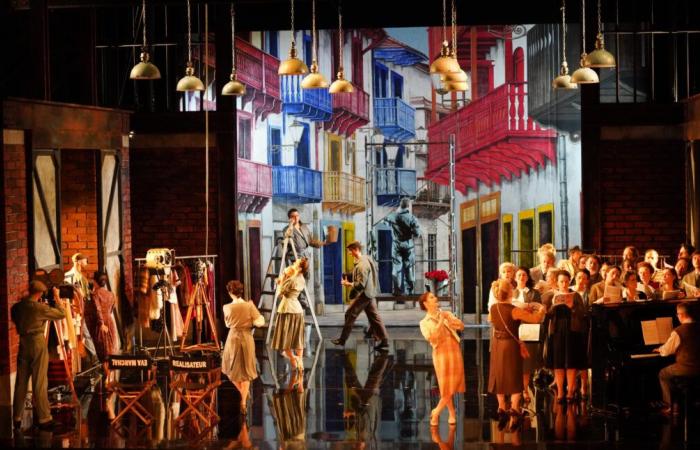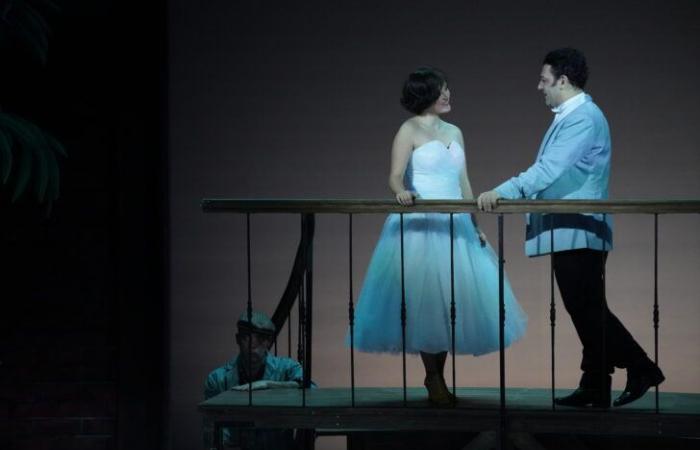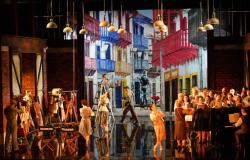More details
Metz. Opera-Theater of the Eurometropolis of Metz. 20-XII-2024. Francis Lopez (1916-1995): The Singer of Mexico, a spectacular operetta in two acts and twenty scenes. Libretto by Félix Gandéra and Raymond Vincy. Verses by Raymond Vincy and Henri Wernert. Adapted by Paul-Émile Fourny, Pénélope Bergeret and Gilles Vajou. Director: Paul-Émile Fourny. Choreography: Graham Erhardt-Kotowich. Set design: Hernán Peñuela. Costumes: Giovanna Fiorentini. Lights: Patrick Méeüs. With Amadi Lagha, tenor (Vincent Etchebar); Perrine Madoeuf, soprano (Eve Marchal / Tornada); Régis Mengus, baritone (Bilou); Apolline Hachler, soprano (Cricri); Gilles Vajou (Cartoni). Choirs of the Opera-Théâtre de l'Eurométropole de Metz (choir director: Nathalie Marmeuse). Ballet of the Opera-Théâtre de l'Eurométropole de Metz (ballet director: Laurence Bolsigner-May). National Orchestra of Metz Grand Est, conductor: Victor Rouanet
Thanks to a skillful transposition, Paul-Émile Fourny and his teams prove that the works of Francis Lopez can still be successful. Spirit, humor and good humor are the ingredients of this spectacular operetta which, when it is well served scenically and musically, retains all its relevance.
It's a great idea to offer for the end of year celebrations. The Singer of Mexicoundoubtedly Francis Lopez's best-known operetta. Inspired in part by the rewriting proposed by the Théâtre du Châtelet in 2006, Paul-Émile Fourny chose to simplify the action by transposing it into the context of the shooting of a film in Montmartre, at the film studios of Francoeur Street. Vincent Etchebar and his inseparable Bilou work there in the painters' workshop, before the first manages to get hired to replace the failing tenor. Entirely successful transposition, even if certain scenes in the second act, notably the scenes with Tornada, are more difficult to integrate into the general economy of the play. This recontextualization allows in any case the always welcome modalities of theater within the theater, which allow by mise-en-abyme effect to introduce the second degree responsible for emphasizing with a discreet wink everything that this repertoire owes to the convention and tradition. Here, certain characters address the conductor or the audience directly. The choir on stage rehearses its numbers under the direction of its leader in real life, Nathalie Marmeuse, who, in her stage costume, therefore plays her own character. The same goes for the choreographer and the pianist of the choir. We particularly appreciated the audition scene, where Elvis Presley and a young aspiring singer named Luis Mariano were successively failed, both considered old-fashioned and old-fashioned. The dusting off of the dialogue was also very successful, enriched with a certain number of gags relating to the ever-effective repetition comedy: the assistant director's megaphone, the name of Vincent Etchebar tirelessly tossed around, etc. We will obviously forgive the deletion of certain numbers or even the reorganization of the musical part: “Maïtechu” sung on the second floor and addressed to Cricri, for example. For the rest, the production remains entirely faithful to the recipes of the grand spectacle operetta which brought joy to our parents and grandparents. The direction of actors by Paul-Émile Fourny, the breathtaking costumes of Giovanna Fiorentini, all in the spirit of the 50s, the skillful sets of Hernán Peñuela, a clever construction of frames and painted canvases, the wild choreographies of Graham Erhardt -Kotowich as well as the superb lighting by Patrick Méeüs contribute to the success of a show enthusiastically acclaimed by a room attic.
The success of the evening is also due to the quality of the musical rendition. It's not every day that we hear the music of Francis Lopez played by a real symphony orchestra and by seasoned opera singers who do not need sound amplification. The music obviously emerges embellished, and we appreciate all the more the richness of its instrumentation, the inventiveness of its rhythms or the naturalness of its melodies. Another repertoire entirely to be rediscovered. Vocally, all the ingredients were there to make a Bohemia successful. Incidentally, three of the leads were heard in this opera on this same set. In the role formerly written for Luis Mariano, Amadi Lagha brings to voice a tenor much more valiant than the creator of Vincent Etchebar, capable of brilliantly resonating all the formidable highs and highs that punctuate his score. At his side, Régis Mengus has a solid baritone which he uses wonderfully for the endearing role of the protagonist's sidekick. Superb stage and vocal performance from Perrine Madoeuf, endowed with a true operatic soprano who gives all her credibility to the character of Eva Marchal, an impossible “capricious and proud” cinema diver as singers are supposed to be opera. In the role of Parigote Cricri, Apolline Hachler brings chic and class instead of the cheekiness of the first performers of the role. Her soprano can still be improved, even if she already has very beautiful high notes which she uses with taste and musicality. We will also salute the singing turn of actor Gilles Vajou, particularly touching in the role of the impresario Cartoni. We must also salute all the artists of the choir and the ballet, as well as the actors responsible for the spoken parts who all, in what remains essentially a team effort, contributed to the happiness of the public and to the festive spirit inseparable from this end of year period.
Photographic credit: © Philippe Gisselbrecht – Opéra-Théâtre de l’Eurométropole de Metz
(Visited 1 times, 1 visits today)
More details
Metz. Opera-Theater of the Eurometropolis of Metz. 20-XII-2024. Francis Lopez (1916-1995): The Singer of Mexico, a spectacular operetta in two acts and twenty scenes. Libretto by Félix Gandéra and Raymond Vincy. Verses by Raymond Vincy and Henri Wernert. Adapted by Paul-Émile Fourny, Pénélope Bergeret and Gilles Vajou. Director: Paul-Émile Fourny. Choreography: Graham Erhardt-Kotowich. Set design: Hernán Peñuela. Costumes: Giovanna Fiorentini. Lights: Patrick Méeüs. With Amadi Lagha, tenor (Vincent Etchebar); Perrine Madoeuf, soprano (Eve Marchal / Tornada); Régis Mengus, baritone (Bilou); Apolline Hachler, soprano (Cricri); Gilles Vajou (Cartoni). Choirs of the Opera-Théâtre de l'Eurométropole de Metz (choir director: Nathalie Marmeuse). Ballet of the Opera-Théâtre de l'Eurométropole de Metz (ballet director: Laurence Bolsigner-May). National Orchestra of Metz Grand Est, conductor: Victor Rouanet
Keywords of this article







